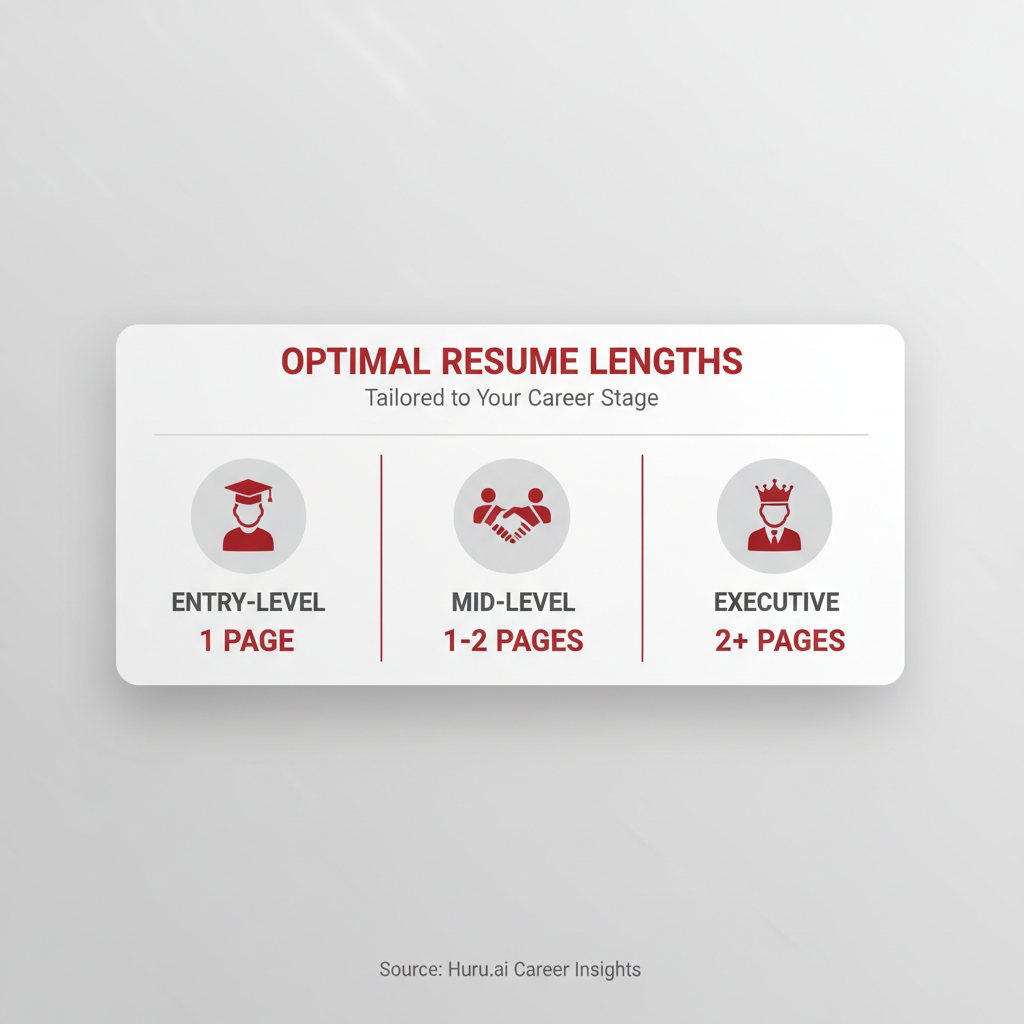Resume Length 2025: How Long Should Your Resume Be? (Expert Tips & Table)


📏 The Resume Dilemma: Why Length Matters in 2025
One of the most common—and hotly debated—questions in the job search is simple: How long should your resume be? As recruitment tech evolves and hiring trends shift, the answer in 2025 is more nuanced than ever. The ideal resume length depends on your career stage, industry, and even the technology used in modern applicant tracking systems (ATS).
Let’s break down the latest research, expert advice, and real recruiter preferences to help you craft a resume that’s both concise and compelling.
💡 Key Takeaway
In 2025, most resumes should be one page for early-career professionals and two pages for those with 10+ years of experience. Only academic CVs or federal roles should exceed this—always prioritize relevance over length.
🎯 Entry, Mid, or Executive? Decoding Resume Length By Career Stage
The most effective resume isn’t about cramming your entire history—it’s about surfacing your most relevant skills for the role you want. Here’s how length recommendations break down by experience.
- Entry-Level & Students: 1 page. Focus on education, relevant skills, internships, and key projects.
See expert student resume tips » - Mid-Level Professionals: 1–2 pages. Highlight 5–10 years of experience, with extra detail on recent roles.
- Senior & Executives: 2 pages. Showcase leadership, quantifiable achievements, and strategic impact.
- Academic CVs / Federal Jobs: 2+ pages (as required). Only for specialized fields—include full citations, grants, or government experience.

🔍 Recruiters Speak: What Hiring Managers Want in 2025
What do recruiters and hiring managers actually say? Recent surveys and interviews reveal that 77% of recruiters prefer a one-page resume for junior roles, but are open to two pages for accomplished professionals. What matters most:
- Relevance: Only include recent, role-specific achievements.
- Brevity: Use concise, results-oriented bullet points (no more than 2 lines each).
- Clarity: Avoid jargon and complex formatting—especially for ATS-friendly resumes.
- Visual Appeal: Clean headings, spacing, and readable fonts improve both human and ATS readability.
🤔 People Also Ask: Your Top Resume Length Questions, Answered
A: Two pages are fine if your experience warrants it. But avoid fluff—keep every point relevant to the role.
A: Yes. In the US, one to two pages is standard. Some countries expect longer CVs, especially for academic or government roles.
A: Focus on transferable skills and relevant projects. Consider adding a portfolio or video resume—see this video resume guide.
A: Yes—within reason. Use no less than 0.5″ margins and 10pt font for readability and ATS compatibility.
A: It doesn’t matter much for ATS, but conciseness and keyword alignment are crucial. Learn more in our ATS keyword guide.
💡 Key Takeaway
Think quality, not quantity. Recruiters spend just 6–8 seconds on a first scan—your resume should communicate impact instantly.
📝 Formatting Hacks: Making Every Inch Count
- Margins: Use 0.5–1 inch to maximize space without crowding text.
- Font & Size: Stick to easy-to-read fonts like Arial, Calibri, or Helvetica, 10–12pt.
- Section Prioritization: Move education below work experience for professionals with 3+ years of experience.
- Bullet Points: Limit each to 2 lines and quantify results where possible.
- White Space: Don’t be afraid of it—white space improves scannability and modern appeal.
- File Format: Submit as PDF unless asked otherwise to maintain formatting across devices.
For more advanced formatting and ATS optimization, check out this in-depth ATS resume guide.
🚀 Go Beyond: Visual & Digital Resumes for the Modern Job Search
In a world where recruiters view resumes on mobile and desktop alike, your formatting must be both visually engaging and ATS compatible. For creative or digital roles, consider supplementing your document with a video or infographic resume.
Discover how to leverage these formats to stand out in this guide.
🎥 Watch: Expert Advice on Resume Length (2025)
⏱️ Checklist: Before You Hit “Send”
- ✔️ Is your resume the recommended length for your career level?
- ✔️ Have you included only relevant, recent experience?
- ✔️ Are your bullet points achievement-oriented and easy to scan?
- ✔️ Is your formatting clean, modern, and ATS-optimized?
- ✔️ Did you proofread thoroughly—no typos, no errors?
- ✔️ For students or new grads: Check these entry-level resume tips
- ✔️ Want an AI-powered edge? Practice interview questions with Huru for free »
💡 Key Takeaway
Your resume is your story—make every line count. With the right length and optimized content, you’ll capture recruiter attention and land that all-important interview.
Further Reading & Resources
- Ats Friendly Resumes How To Get Past The Bots And Land The Interview
- Common Resume Mistakes To Avoid Dont Sabotage Your Job Search
- Beyond The Resume Highlighting Hidden Strengths In Your Interview
- The Ultimate Guide To Resume Keywords Get Past The Ats And Land The Interview
- How A Video Resume Can Give You The Edge In Video Interviews
About the Author
Elias Oconnor is a content writer at Huru.ai, specializing in actionable career advice, job search trends, and interview strategies. Elias is passionate about helping professionals turn anxiety into confidence through technology and practical guidance.



 Jun 25,2024
Jun 25,2024  By Elias Oconnor
By Elias Oconnor